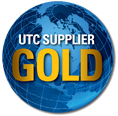Bringing it All Back Home; Outsourcing Loses its Appeal
MANUFACTURING: Six Sigma Quality Control Raises Quality
By Tom York
Monday, August 13, 2012
The rebounding economy is proving a boon to Quality Controlled Manufacturing Inc.
Rick Urban, COO of the Santee-based precision machining manufacturer, says business has been improving as customers abandon offshore subcontractors — some as close as Mexico and as far away as China — in favor of local suppliers.
“China, in particular has lost some of its cost competitiveness,” he said, noting the cost of labor has increased as well as the cost of shipping to and from the U.S.
“The total package wasn’t as attractive as it once was,” he added. “As a result, there has been a push for near-sourcing because you can get orders into the production stream faster.”
Urban says his “core of customers” includes aerospace parts manufacturer Hamilton Sundstrand, a unit of Hartford, Conn.-based United Technologies Corp. United Technologies also agreed to purchase North Carolina-based Goodrich Corp. last year.
The combined companies are now called UTC Space Systems.
Other customers include Poway-based defense contractor General Atomics and Kearny Mesa-based Solar Turbines Inc., a division of Peoria, Ill., heavy equipment manufacturer Caterpillar Inc.
Company Reaches 100-Employee Milestone
The company also does work for Precision Conversions LLC in Portland, Ore., which keeps Boeing 757-200 cargo jets up to date for their owners.
Half of the customers are in aerospace, while 20 percent are in defense.
“The aerospace sector is increasing as demand for new planes increases,” he said.
The company recently announced that it had reached the 100-employee milestone, among other recognitions.
In July, the San Diego Business Journal recognized QCMI as one of San Diego’s 100 fastest-growing privately held companies, an achievement based on the percentage increase in revenue between fiscal years 2009 and 2011.
The 34-year-old company reported 63 percent growth over the three-year period.
Urban projects the growth should continue into 2013 and 2014.
Machinist Bob Grande launched the business in 1978 out of his garage, and as orders grew, he shifted to a 27,000-square-foot facility in Lakeside. Four years ago, he moved to its current state-of-the-art, 65,000-square-foot machine shop. He remains CEO.
Components Require Stringent Quality Controls
The components that QCMI processes can have complex shapes, contours, and require exacting tolerances and stringent quality controls, said Urban. The company provides such services as turning, milling and grinding, as well as conventional machining and welding.
Other services include assembly, fabrication, inspection, testing and supply chain management.
Assembly is important because customers want orders ready to go when delivered to increase efficiency.
Urban said most of his customers are located in San Diego.
One reason they prefer doing business with QCMI is because of its emphasis on quality control, including adoption of the Six Sigma management strategy first developed at GE Corp. to reduce manufacturing errors.
“This is the new way that manufacturing is going,” said Urban. “Either you’re on board with doing the Six Sigma manufacturing, or you’re not going to compete with lower cost competitors.”
Under Six Sigma, companies commit to finding and eliminating as many errors as they can in their processes, which in turn assures high quality work.
In February, the company received supplier gold status for the third consecutive year from UTC, which demonstrates that QCMI has shown exceptional performance over a one-year period.
Marc Turgeon, supply chain manager for Precision Engine Controls Corp. in Sorrento Valley, which is a unit of UTC, said he’s worked with QCMI on and off for the past 15 years.
“They’ve been a longtime supplier to United Technologies as well as Solar Turbines, which happens to be our largest customer,” said Turgeon. “They’re one of the few gold suppliers with UTC, which is a very rigid and not-easy-to-acquire distinction.”
He said he likes the flexibility of the company, and its willingness to shift roles as conditions change.
“We used to make some parts here in house that we moved to Poland, but QCMI still makes a piece of the volume,” added Turgeon. “It’s not easy to take work and move it offshore, but they have been quite supportive.”
“It’s hard to find what we offer when it comes to the complexity of the parts we manufacture,” said Urban. “We want to keep it that way.”


